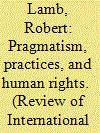| Srl | Item |
| 1 |
ID:
168864


|
|
|
|
|
| Summary/Abstract |
This article is an intervention in recent debates about conceptual and normative theorisations of human rights, which have been increasingly characterised by a divide between ‘moral’ and ‘practice-based’/’political’ understandings. My aim is to articulate an alternative, pragmatist understanding of human rights, one that is importantly distinct from the practice-based account with which it might be thought affiliated. In the first part of the article, I reveal the fundamental flaw in the practice-based account of human rights: I argue that it is undermined by the ontological thesis at its heart, which naturalises and reifies political arrangements and institutions that are radically contingent. In the second part, I identify, and outline the attractiveness of, a pragmatist normative account of human rights. In contrast to the practice-based approach, this pragmatist account construes human rights in ideational terms. The pragmatist understanding accepts both the contingency of our practices and the cultural limits to moral justification, while nevertheless retaining a commitment to the enterprise of normative philosophical conversation. I argue, in contrast to prevailing interpretations, that the international theory advanced by John Rawls exemplifies a pragmatist account of human rights and points a way forward for theoretically fruitful but appropriately circumscribed analysis of the concept.
|
|
|
|
|
|
|
|
|
|
|
|
|
|
|
|
| 2 |
ID:
187676


|
|
|
|
|
| Summary/Abstract |
In this article, I show that Richard Rorty’s unduly neglected normative political theory advances a far more distinct and demanding form of liberalism than is usually attributed to him. Attention to how Rorty understands solidarity—and its corresponding conception of public obligations—encourages analysis of his nonjuridical vision of liberal community. Through examination of his oft-ignored, revealing interpretation of Vladimir Nabokov and instructive comparison with the thought of Judith Shklar, I argue that, for Rorty, the sustainability of a liberal community requires an ethos of curiosity, whereby citizens feel moved to uncover and understand the personal experiences of cruelty and humiliation endured by others. We can make sense of this ethos and its demands of us through rethinking the idea of political conversation. This understanding of Rorty’s intellectual project not only enriches our appreciation of his complex political theory but also contests the meaning and implications of liberalism itself.
|
|
|
|
|
|
|
|
|
|
|
|
|
|
|
|